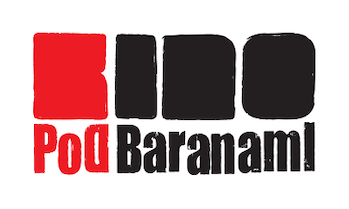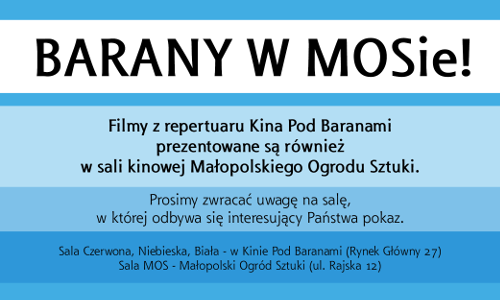5. Objazdowy Festiwal Filmowy WATCH DOCS. Prawa człowieka w filmie - NIEDZIELA
|
5. OBJAZDOWY FESTIWAL FILMOWY WATCH DOCS. PRAWA CZŁOWIEKA W FILMIE
niedziela, 18 listopada
Sunday, November 18
SALA NIEBIESKA
10.00 KUBA
FIDEL CASTRO, DZIECIŃSTWO WODZA | FIDEL CASTRO, THE CHILDHOOD OF THE LEADER
reż. Daniel Leconte, Francja 2004, 55'
Nie tylko sugerowane przez tytuł filmu “dzieciństwo wodza”, ale także rewolucja 1959 r., aż do wyraźnego przyjęcia przez nowy reżim systemu komunistycznego przedstawione są w filmie Leconte’a z wyraźnym demistyfikatorskim zacięciem. Bogate materiały archiwalne zestawione są tu z wypowiedziami byłych najbliższych współpracowników Castro, późniejszych wnikliwych jego krytyków. Leconte odmalowuje w ten sposób konsekwentną i bezwzględną drogę Fidela do pełni dyktatorskiej władzy.
Not only the childhood of the leader implied in the film’s title, but also the revolution of 1959, up till the new regime clearly adopted the Communist system, are presented in Leconte’s film with distinct demystifactory verve. Ample archive materials are brought together with the statements of the Castro’s closest former associates, who later became his most discerning critics. In this way Leconte depicts Castro’s persistent and ruthless road to total dictatorial power.
11.00 KUBA
POMIMO | NEVERTHERLESS
reż. Judith Grey, Kuba 2003, 50'
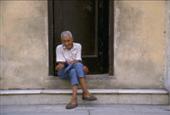
W swoim dokumencie Judith Grey portretuje Kubę i jej mieszkańców, kierując spojrzenie kamery na przedmioty, jakimi Kubańczycy zastępują nieobecne na rynku towary. Są to artykuły własnego wyrobu, wytwarzane z ogromną nieraz pomysłowością i fantazją, z dosłownie wszelkich materiałów. Pomimo wymownie świadczy o duchu indywidualnej inicjatywy i kreatywności mieszkańców wyspy, którego nie zdołały zniszczyć lata totalitarnego reżimu.
Judith Grey provides a look at Cuba and its residents through the objects they use to replace goods not available on the market. These goods are made with extreme ingenuity and fantasy out of everything at hand. Netherless is testament to the spirit of individual initiative and creativity of the island’s residents that could not be destroyed by years of a totalitarian regime.
BEYOND THE SEA (EN)
reż. Lisandro Pérez-Rey, USA/Kuba 2003, 79' 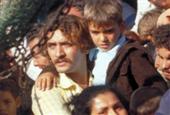
5 maja 1980 roku kubański autobus rozbił bramę peruwiańskiej ambasady w Hawanie. W 57 kilka chwil później teren ambasady wypełnił się 10-tysięcznym tłumem. Zdesperowani ludzie pragnęli za wszelką cenę opuścić wyspę. Fidel Castro pozwolił wówczas „zdrajcom rewolucji” wyjechać z kraju. Tak rozpoczęła się najbardziej dramatyczna i największa fala ucieczki z Kuby, tzw. Mariel Boatlift. W ciągu kilku tygodni ponad 130 tysięcy Kubańczyków, ryzykując życiem, na małych rybackich łodziach próbowało dotrzeć do wybrzeży Stanów Zjednoczonych.
On May 5, 1980, a Cuban bus crashed the gate of the Peruvian embassy in Havana. Seconds later, the embassy grounds were filled with a crowd of ten thousand. Desperate people wanted to leave the island at any price. Fidel Castro let the “traitors of the revolution” leave the country. That was the beginning of the most dramatic and largest exodus from Cuba, the Mariel Boatlift. Over a few weeks, more than 130 thousand Cubans risked their lives on small fishing boats attempting to reach the shores of the United States.
13.15 KUBA
NOBODY LISTENED (EN)
reż. Jorge Ulla i Nestor Almendros, USA 1988, 117'
Néstor Almendros i Jorge Ulla demistyfikują Kubę Fidela Castro. Trzydzieści osób - ofiar jego reżimu, wśród których są i byli towarzysze i niezależni artyści, odsłania prawdę o brutalnych metodach, przy pomocy których reżim utrzymuje się przy władzy.
Néstor Almendros and Jorge Ulla demystify Fidel Castro’s Cuba. Thirty people - victims of the regime, who also include former comrades and independent artists, reveal the truth about the brutal methods used by the regime to remain in power.
Słowo komentarza: Daniel B. Burns
15.45 PODRÓŻ NA WSCHÓD - AZJA
A LONG STRUGGLE (EN)
reż. Lea Rekow, USA 2006, 18'
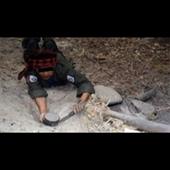
Tribeca 2006 - Short Documentary
Ann Arbor FF 2006
Uzbrojona w szpiegowską kamerę i podająca się za nauczycielkę Lea Rekow potajemnie przekracza granicę Tajlandii z Birmą, by udokumentować wstrząsający los Birmańczyków żyjących pod władzą skorumpowanej junty. A Long Struggle dokumentuje wpływ min przeciwpiechotnych i rządową politykę pracy przymusowej, tortur, gwałtów i narkotyków na różne mniejszości etniczne, które walczą o przetrwanie w południowo-wschodnim rejonie kraju.
Armed with a spy camera and posing as a school teacher, filmmaker Lea Rekow secretly crossed the border of Thailand into Burma to document the startling resilience of the Burmese people who live under the rule of a corrupt junta. A Long Struggle documents the impact of landmines and the government's use of forced labor, torture, rape and drugs on the various ethnic minorities that continue to survive in the South East region of Burma.
CAŁKOWITE ZAPRZECZENIE | TOTAL DENIAL
reż. Milena Kaneva, Włochy/Bułgaria 2005, 77' 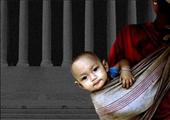
One World 2006 - nagroda specjalna Vaclava Havla dla Mileny Kanevy
Human Rights Watch NY 2006
Jeden człowiek, poszukiwany przez prawo zarówno w Birmie, jak i w Tajlandii - Ka Hsaw Wa. Praca niewolnicza - powszechna praktyka w Birmie, kraju, który nazywa się teraz Myanmar, kontrolowanym przez wojskową dyktaturę. Dwie zachodnie korporacje, robiące interesy z juntą niesławną naruszeniami praw człowieka. To historia budowy w Birmie rurociągu naftowego Unocal/Total.
One man wanted by the law both in Burma and in Thailand, called Ka Hsaw Wa. Slave labor, a common practice in Burma, a country now called Myanmar, controlled by a military dictatorship. Two western corporations making business deals with a junta infamous for human rights abuses. This is the story of a construction of the Unocal/Total oil pipeline in Burma.
17:30 SPOTKANIE BIRMAŃSKIE
we współpracy ze Stowarzyszeniem Solidarność Polsko - Birmańska
18.30 MY PRZYBYSZE
37 ZASTOSOWAŃ MARTWEJ OWCY | 37 USES FOR A DEAD SHEEP
reż. Ben Hopkins, Wieka Brytania 2006, 85'
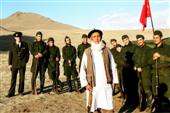
Hot Docs 2006 - Best International Documentary
Tribeca 2006
Berlinale 2006 - Caligari Prize
Seattle 2006
Jerusalem FF 2006
37 zastosowań martwej owcy to historia ludu pamirskich Kirgizów. Wywodzący się z Centralnej Azji, a liczący dziś około 2 000 osób lud od 27 lat przebywa na wygnaniu we wschodniej Turcji. Niechęć do komunizmu skłoniła go najpierw do opuszczenia Związku Radzieckiego, później maoistowskich Chin i wreszcie najechanego przez ZSRR Afganistanu.
The Pamir Kirghiz are a tribe of some 2.000 people from the Pamir region of Central Asia. For the last 27 years they have lived in exile in Eastern Turkey. The Pamir Kirghiz’ antipathy to Communism drove them from the Soviet Union, then later from Maoist China, and finally from the Soviet invasion of Afghanistan.
20.15 KAMPANIE WYBORCZE ZZA KULIS
MÓJ KRAJ, MÓJ KRAJ | MY COUNTRY, MY COUNTRY
reż. Laura Poitras, USA 2006, 90' 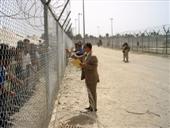
Karlowe Wary 2006
Berlinale 2006
Inspiration Award - Full Frame FF
Flahertiana 2006 - Best Long Documentary
New York FF 2006
Irackie wybory w styczniu 2005 roku przykuły uwagę świata. Do pewnego stopnia były traktowane jak sprawdzian nowej ery w światowej polityce, znaczonej użyciem przez USA siły zbrojnej dla osiągnięcia celów takich, jak zaprowadzenie demokracji na Bliskim Wschodzie. Głównym bohaterem filmu jest doktor Riyadh, kandydujący w wyborach sunnita. Otwarcie krytykując okupację, jest on jednocześnie zagorzałym zwolennikiem zbudowania w Iraku demokracji. Mój kraj, mój kraj historię lekarza opowiada na szerokim tle przygotowań do nadchodzących wyborów.
The Iraqi elections in January 2005 captivated the world's attention. To a certain extent, they were a litmus test of a new era in world politics, where the United States uses military power to achieve goals such as attaining democracy in the Middle East. The film shows the aforementioned contradictions from the Iraqi perspective - the film's hero is Dr. Riyadh, a Sunni running in the elections. My Country, My Country, tells the story of a doctor against the broad background of preparations for the upcoming elections.
22.00 KAMPANIE WYBORCZE ZZA KULIS
PREZYDENT MIR QANBAR | PRESIDENT MIR QANBAR
reż. Mohammed Shirvani, Iran 2005, 65'
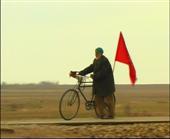
Rotterdam 2006
Yamagata 2005 - New Asian Currents Awards
Sheffield 2005
Tribeca 2006
Sarajevo 2006
Mir Qanbar Heidari to uczciwy 75-letni mieszkaniec irańskiej wioski, były pracownik ministerstwa spraw wewnętrznych, który chce być prezydentem Iranu. Pięć razy startował w wyborach do parlamentu, a trzy razy kandydował na prezydenta. Za każdym razem był dyskwalifikowany.
Mir Qanbar Heidari, a 75-year-old honest villager from a remote village in Iran, once an employee of Iran's Ministry of the Interior has persistently tried to become the President of Iran. He has run for the Parliament five times and for the President of Iran three times before this. Each time he’s disqualified.
SALA BIAŁA
10.00 PODRÓŻ NA WSCHÓD - AZJA
POWRÓT DO GRANICY | RETURN TO BORDER
reż. Noja, Francja 2005, 56'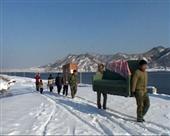
INPUT 2006
Fascynujący dokumentu o pograniczu chińsko-koreańskim, stanowiący świadectwa zmian w mentalności ludzi postępujących wraz z ewolucją systemów politycznych.
Documentary about the frontier zone between China and North Korea.
11.00 PODRÓŻ NA WSCHÓD - AZJA
PORWANIE | KIDNAPPED!
reż. Melissa Kyu-Jung Lee i John Janson-Moore, Australia 2005, 52' 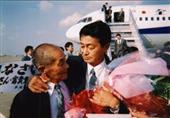
IDFA 2005 - Silver Wolf Competition
One World 2006
Thessaloniki 2006; DocNZ 2006
Od wczesnych lat 70. po połowę 80. mnóstwo zwyczajnych Japończyków zniknęło bez śladu - wielu z nich z plaż i odległych wiosek nad Morzem Japońskim, inni z Tokio, Londynu czy Madrytu. Po dekadach domysłów i spekulacji, w końcu w 2002 roku ujawniono, że ci zwykli obywatele Japonii zostali porwani przez północnokoreańskich szpiegów komunistycznej dyktatury Kim Jong Ila.
From the early 1970s to the mid-80s, scores of ordinary Japanese began disappearing without a trace, many of them from beaches and remote villages along the Japan Sea coast, others from Tokyo, London and Madrid. After decades of speculation, it was finally revealed in 2002 that North Korean spies had in fact abducted these ordinary Japanese citizens as part of a bizarre and sinister plot of espionage by the hardline, communist dictatorship of Kim Jong Il.
12.00 KUBA
ŚPIĄCA WYSPA | THE SLEEPING ISLAND
reż. David Martín de los Santos, Hiszpania 2005, 58'
Documenta Madrid 2006
Iluzje, nadzieje i wiara to broń, dzięki której staramy się przetrwać przeciwności. Religia, zabobon i sztuka to sfery, w których możemy rozwinąć koncepty wykreowane przez naszą wyobraźnię, aby walczyć z cierpieniem. Dzisiejszy Kubańczyk śni, a ten film chciałby być wyprawą na prawdziwą Kubę, tak prawdziwą, jak jej sny.
Illusion, hopes, and faith are weapons that we create to survive in the face of adversity. Religion, superstition and art are spaces where we can develop the concepts created by our imagination to fight suffering. The Cuban citizen is a dreamer, and this film attempts to make a trip towards a real Cuba, as real as its dreams.
ODD PEOPLE OUT (EN)
reż. Manuel Zayas, Hiszpania/Kuba 2004, 55' 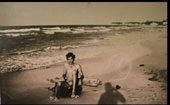
Seres Extravagantes to dokument o procesie społecznej marginalizacji i politycznej represji, jakiemu w dwóch pierwszych dekadach Rewolucji Kubańskiej poddana została społeczność gejowska, procesie widzianym oczami słynnego kubańskiego pisarza Reinaldo Arenasa.
Odd People Out is a documentary about the process of marginalization, repression and denial of the gay community during the first two decades of the Cuban Revolution, through the eyes and voice of Cuban writer Reinaldo Arenas.
14.00 KOSOWO
CHRONOLOGY OF THE CRIME (EN)
reż. Slaven Kranjc, Serbia, 2006, 61'
Kosowo, chronologia wydarzeń.
Kosovo - chronology of the events.
DWIE SIOSTRY | TWO SISTERS
reż. Jasna Krajinovič, Belgia 2005, 58'
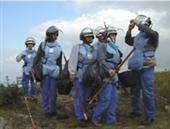
Ecocinema, Athens 2006
Violeta i Vyollca Dukay mieszkają w południowym Kosowie, niedaleko granicy z Albanią. Ich kraj od czasów wojny zmaga się z wysokim bezrobociem. Aby zapewniæ sobie utrzymanie, siostry zostają saperkami. Od sześciu lat codziennie chodzą na pola minowe. Dramat w kraju wspaniałych lasów, pastwisk, gór… i ukrytych min.
Violeta and Vyollca Dukay live in the south of Kosovo, close to the border with Albania. Faced with a very high unemployment in their country since the end of the war, they became deminers. They’ve been going to the minefields every day for six years now. A drama in a country of magnificent forests, pastures, mountains... and hidden mines.
16.15 KUBA
BENIGNO, FAREWELL TO REVOLUTION (EN)
reż. Marlou van den Berge, Holandia 2005, 55' 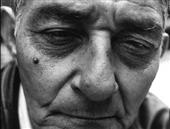
One World 2006
Dariel Alarcón, alias Benigno całe życie spędził w służbie Rewolucji. W 1957 r. młody Kubańczyk, wtedy jeszcze prosty, niepiśmienny rolnik, został zwerbowany do powstańczej armii Fidela Castro. Został pułkownikiem, walczył w Boliwii u boku Che Guevary i był jednym z nielicznych ocalałych, którym udało się wrócić na Kubę. Mimo kariery, jaką zrobił dzięki reżimowi Castro, rozczarowany uciekł do Paryża w 1995 roku. Dziś bezrobotny, szuka tam pracy przy remontach mieszkań.
Dariel Alarcón, alias Benigno, spent his whole life serving the Revolution. In 1957, the young Cuban, then still a farmer, was recruited into Fidel Castro’s rebel army. From an illiterate farmer he made it to colonel, fought in Bolivia together with Che Guevara and was among the very few survivors who returned to Cuba. After a career under Castro’s government he flew to Paris, disillusioned, in 1995. Alarcón’s life is like a cruel trick of fate: from a young revolutionary to an out-of-work manual labourer in Paris.
17.15 KOSOWO
PRETTY DYANA (EN)
reż. Boris Mitić, Serbia 2004, 45'
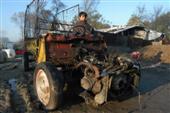
Amsterdam IDFA, “First Appearance” competition
RomaDocFest, audience award
Sarajevo Film Festival, human rights award
Prizren Dokufest, best documentary
Astra Film Fest Sibiu, best central & eastern european documentary
Filmowy portret belgradzkiej społeczności romskich uchodźców z Kosowa, którzy zarabiają na życie przerabiając klasyczne stare Citroëny 2cv i Dyana w przypominające styl Mad Maxa pojazdy, służące im do zbierania tektury, butelek i złomu.
An intimate look at Gypsy refugees from Kosovo who make a living by transforming Citroën’s classic 2cv and Dyana cars into Mad Max-like recycling vehicles, which they use to collect cardboard, bottles and scrap metal.
UNMIK TITANIC (EN)
reż. Boris Mitić, Serbia 2004, 56'
IDFA
Documenta Madrid
Meetings in Siberia
One World
Prisztina, Kosowo, 31 grudnia. 500 000 Albańczyków, 5 000 żołnierzy sił pokojowych. Ostatnich 100 Serbów - wszyscy zamknięci w jednym budynku, którego nigdy nie mogą opuścić. W samym centrum. Od czterech lat. Czekając na świętego Mikołaja, albo na powodzenie największej misji Narodów Zjednoczonych.
Pristina, Kosovo, December 31st. 500 000 Albanians. 5 000 peacekeepers. The last 100 Serbs - all trapped inside one building, which they can never leave. Downtown. Four years and counting. Waiting for Santa Claus, or for the largest UN mission to succeed.
19.00 PODRÓŻ NA WSCHÓD - AZJA
NIEZAPOMNIANY DZIEŃ | A DAY TO REMEMBER
reż. Liu Wei, Chiny 2005, 13' 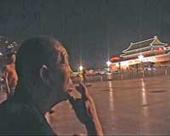
IDFA 2005 - Silver Cub Award Competition
Cinema du Reel 2006
Na terenie uniwersytetu i na placu Tiananmen reżyser Liu Wei zadaje pekińskim przechodniom proste pytanie: „Czy wiesz, jaki jest dzisiaj dzień?” „4 czerwca 2005 roku” - odpowiada poprawnie większość pytanych, ale wielu z nich odgaduje od razu, w jakim kierunku zmierzać będzie rozmowa. A Day to Remember przekonująco wykazuje, że krwawo stłumiona studencka rewolta 1989 r. pozostaje w Chinach tematem tabu.
With a camera and one simple question, the Chinese filmmaker Liu Wei heads for the University of Beijing and Tiananmen Square. "Do you know what day it is today?" he asks passers-by, mainly students and young people. "June 4th, 2005," most people answer correctly, but many of them already guess where the conversation is leading. Liu convincingly demonstrates that the revolt is still a taboo subject in China.
MY PRZYBYSZE
OPERATION SPRING (EN)
reż. Angelika Schuster i Tristan Sindelgruber, Austria 2005, 94'
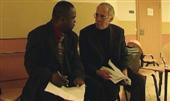
Rotterdam 2006
One World 2006
Wczesnym rankiem 27 maja 1999 r. 850 policjantów weszło do mieszkań i noclegowni uchodźców na terenie całej Austrii. W tej największej od 1945 r. w austriackiej historii operacji policyjnej, o kryptonimie „Operacja Wiosna”, aresztowanych zostało około stu Afrykanów. W „Operacji Wiosna” i w serii następujących po niej procesów zastosowano nowe metody dochodzeniowe i nowe prawo proceduralne, utrudniające oskarżonym obronę. Zapadły surowe wyroki.
In the early hours of the morning of 27 May 1999, 850 police officers invaded the apartments and night shelters of refugees throughout Austria. In the largest police operation launched in Austria since 1945, code named “Operation Spring”, around 100 Africans were arrested. New methods of investigation and a new procedural law were used in “Operation Spring” as well as in the series of successive proceedings, making it difficult for the accused individuals to defend themselves. Severe sentences were passed.
21.00 PANORAMA FILMÓW O PRAWACH CZŁOWIEKA
PERSONA LEO N. | THE PERSON DE LEO N.
reż. Alberto Vendemmiati, Włochy 2005, 85' 
IDFA 2005
One World 2006
Parnu 2006
Alberto Vendemmiati, współautor słynnego filmu Jung (Wojna) w kraju mudżahedinów, podejmuje temat transseksualizmu i operacyjnej zmiany płci. Dostrzega w nim przede wszystkim tajemnicę przemiany oraz zależności i napięcia między prawem człowieka do bycia sobą, a oczekiwaniami społeczeństwa, zwłaszcza najbliższych. Nie ma tu śladu taniej sensacji, mimo że centralną sceną filmu Vendemmiati uczynił samą operację.
Alberto Vendemmiati, the co-director of the acclaimed film Jung (War) in the land of the Mujaheddin, deals with the issue of transsexuality and sex change operations. He finds the secret of transformation, as well as both dependence and tension between an individual’s right to be oneself and societal expectations, especially those of the dear ones. There is no trace of cheap sensation or attempt to shock the viewer - even though the films central scene is the operation itself.
Pokazy w ramach 5. Objazdowego Festiwalu Filmowego WATCH DOCS. Prawa człowieka w filmie.
ZAPRASZAMY!
